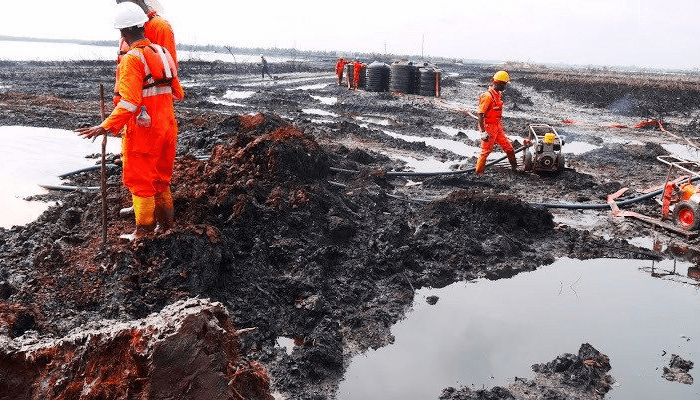Graft claims stain Nigeria’s Ogoni oil clean-up
When Nigeria announced a $1 billion clean-up of oil-ravaged Ogoniland in 2017, expectations soared.
After decades of spills from pipelines operated by international oil companies, the federal government said it was finally ready to heal one of the world’s most polluted regions. The project would be the largest oil clean-up ever attempted in Africa, backed by the United Nations and funded by contributions from energy companies operating in the Niger Delta.
Today, nearly eight years later, the image of progress is marred by allegations of graft, unclear financial reporting and stalled work on the ground. What was once pitched as a symbol of environmental justice has turned into a case study of bureaucracy and mistrust.
The Ogoni clean-up followed a blistering 2011 report by the United Nations Environment Programme which revealed that land, groundwater and surface water across the region had been poisoned by decades of crude exploration.
In some areas, benzene levels, a carcinogen, were reported to be 900 times above World Health Organisation (WHO) guidelines. The United Nations Environment Programme (UNEP) recommended an emergency clean-up spanning 25 years, beginning with the provision of potable water and major soil remediation.
Read also: Ogoni group insists HYPREP’s cleanup falls short
By 2017, then President Muhammadu Buhari’s government said all conditions had been met. A new agency, the Hydrocarbon Pollution Remediation Project (HYPREP), was established to coordinate work.
Funding had been secured from oil companies under the oversight of Nigeria’s petroleum ministry. Communities celebrated. International observers exhaled. After years of environmental activism, a rare victory seemed within reach.
Reality proved slower
According to the Senate Committee on Public Accounts, HYPREP confirmed that by November 2023, $360 million, over one-third of the total fund, had already been released.
But contractors, legislators and local monitoring groups dispute what that spending has achieved. Nigeria’s House of Representatives is now probing whether the project has been weakened by mismanagement and political interference.
Abbas Tajudeen, speaker of the House of Representatives, recently told lawmakers the inquiry is necessary to determine “who manages the funds, how they are applied, which communities are to benefit, and whether transparency and accountability were maintained throughout the process.”
His remarks captured what many in the region have long whispered: nobody is sure where the money is going, and visible progress remains scarce.
Read also: NDDC joins Ogoni cleanup effort, eyes remediation and mangrove restoration tasks with HYPREP
Chinedu Onyegbula, an energy sector analyst, said the frustration stems from the mismatch between the funds released and the minimal change on the ground.
“This process has been ongoing for a while now,” he said. “Very little has been done, and it’s worrisome given that a good number of the contractors are Nigerian.”
For Onyegbula, the House probe is no longer optional.
He believes only a thorough forensic review will determine if delays are the result of incompetence, sabotage or political meddling.
“The National Assembly has oversight functions to ensure compliance in terms of the expenditure so far. If they don’t carry that out, it shows that they are co-playing somehow,” he said.
The stakes stretch beyond Ogoniland. Onyegbula argued that whatever happens with HYPREP will send a message to international oil companies operating across the Niger Delta at a time when the Petroleum Industry Act (PIA) is reshaping environmental regulation.
“The cleanup holds significant implications for future environmental compliance,” he said. “It is an opportunity to show that IOCs must respond to environmental issues and reduce pollution.”
Yet delays continue, and patience is wearing thin in communities that have waited decades for relief.
Some residents say they have seen cleanup sites abandoned for months at a time. Others insist the water projects politicians boast about remain dry or inconsistent.
The absence of progress has revived old tensions, including fears of renewed activism like the 1990s protests led by Ken Saro-Wiwa, which ended in his execution and drew global condemnation.
While communities question the lack of visible progress, government officials cite bureaucratic hurdles.
Muda Yusuf, head of the Centre for the Promotion of Private Enterprise, said the delays reflect the slow execution culture embedded in the Nigerian public sector.
“We have good initiatives, and we have good policies. But when it comes to implementation, we always have issues,” he said.
“This Ogoni cleanup has been going on for close to eight years after it was launched with a huge elaborate ceremony. If there is no traction, then this is a problem of bureaucracy – in releases of money and typical government project bottlenecks.”
HYPREP rejects the suggestion that the clean-up has stalled. In a recent update, the agency insisted that “significant achievements have been recorded,” citing progress in mangrove restoration, shoreline remediation and soil treatment.
It said 14 water facilities have been built, supplying potable water to 40 communities, with five more expected to come online.
The agency also highlights a new Centre of Excellence for Environmental Restoration, which it said is 92 percent complete, as well as an electricity project underway to connect affected areas.
But field reports and independent monitoring groups paint a more complicated picture. Cleanup stages that UNEP expected to take 18 months have stretched beyond six years. Some contractors hired lack prior experience in environmental remediation, while records of fees charged and milestones achieved are not publicly available.
Experts say the government’s challenge now is not only to clean polluted soil, but to clean a damaged narrative. To restore credibility, HYPREP must demonstrate the capacity to finish what it started, a task that will require more than technical expertise. It will require political will.
Back in Ogoniland, farmers drive past rusting pipelines and abandoned pits where crude has seeped into creeks for generations. Children wade through oily water to reach ramshackle schools. Economic hope is thin. Oil spills destroyed more than soil, they erased livelihoods.

